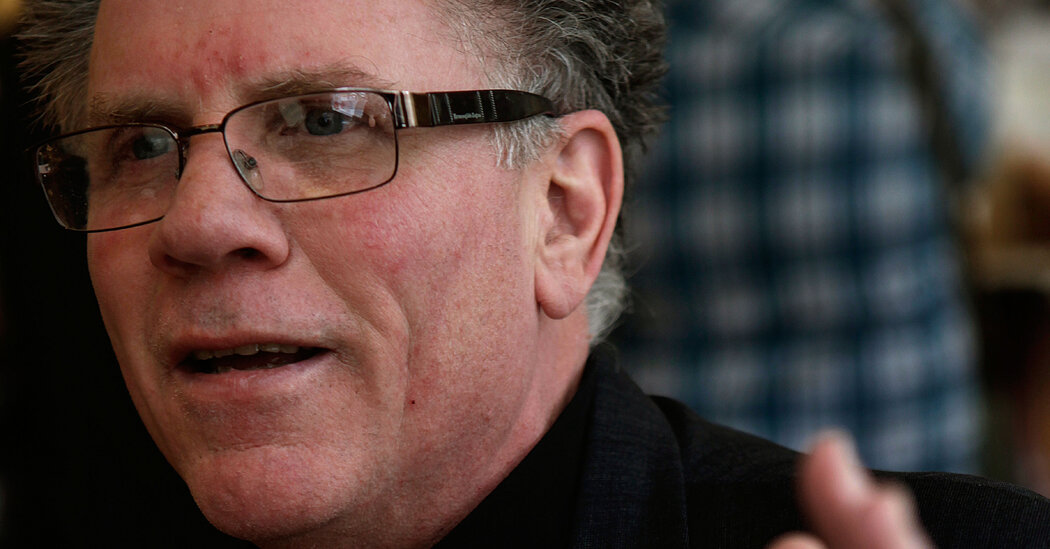Robert W. McChesney, an influential left-leaning media critic who argued that corporate ownership was bad for American journalism and that Silicon Valley billionaires who dominated online information were a threat to democracy, died on March 25, at his home in Madison, Wis. He was 72.
The cause was glioblastoma, an aggressive brain cancer, his wife, Inger Stole, said.
Professor McChesney was grounded both in academia — he had a Ph.D. in communications and taught at universities — and in ink-on-paper journalism: He was the founding publisher of The Rocket, a Seattle music magazine that reviewed Nirvana’s first single.
His primary thesis, expressed in more than a dozen books and in scores of articles and interviews, was that corporate-owned news media was overly compliant with the political powers that be and that it restricted the views Americans were exposed to. He further argued that the promise of the internet — of a Wild West market of opinions — had been throttled by a few giant owners of online platforms.
An early book, “Rich Media, Poor Democracy” (1999), warned that consolidation in journalism would undermine democratic norms. In perhaps his best-known work, “Digital Disconnect: How Capitalism Is Turning the Internet Against Democracy” (2013), he rejected the utopian view that the digital revolution would usher in an open frontier of information sources and invigorate democracy.
Instead, he showed how the internet was devastating the business model for newspapers, while supplanting civically minded coverage of local government with lowest-common-denominator fluff: celebrity gossip, cat videos and personal naval gazing.
Professor McChesney blamed capitalism.
“The profit motive, commercialism, public relations, marketing, and advertising — all defining features of contemporary corporate capitalism — are foundational to any assessment of how the Internet has developed and is likely to develop,” he wrote.
An unapologetic socialist, Professor McChesney argued that the government should give all Americans $200 vouchers to donate to nonprofit news outlets of their choice.
He campaigned for Senator Bernie Sanders’s presidential races. Mr. Sanders returned the favor by writing a forward to Professor McChesney’s book “Dollarocracy: How the Money and Media Election Complex Is Destroying America” (2013), written with John Nichols.
In an interview with Truthout, a nonprofit news site focused on social justice, Professor McChesney attacked the mainstream media’s coverage of Mr. Sanders in the 2016 presidential primary that he lost to Hillary Clinton. CNN and MSNBC, he said, were deeply biased in favor of “centrist” candidates representing the status quo.
“One can only imagine how Sanders would have done if he had coverage from MSNBC similar to what Obama received in 2007-08,” Professor McChesney said.
The conservative writer David Horowitz put Professor McChesney on a list of the “101 Most Dangerous Academics in America” in 2006, including him among “tenured radicals” who were indoctrinating U.S. students.
On the other hand, in 2008 Utne Reader named Professor McChesney as one of the “50 Visionaries Who Are Changing Your World.”
Professor McChesney warned in 2016 that when corporate giants dominate online information — at the time, those giants were Facebook and Google — they hold too much power over what people know of the world.
“This is really antithetical to anything remotely close to a free press and a free society,” he said in an interview with the left-leaning news outlet “Democracy Now!”
The way to deal with such monopolies was to nationalize them, he said. He suggested a government takeover that would make internet behemoths into a quasi-public service, like the Post Office.
Professor McChesney was also one of the founders, in 2003, of a public interest group, Free Press, that opposed corporate consolidation in the news business and that led a national campaign for net neutrality, calling for equal access to the internet for all content producers, from giants like Netflix to individual bloggers.
Robert Waterman McChesney was born on Dec. 22, 1952, in Cleveland, one of two sons of Samuel P. McChesney Jr., an advertising executive at This Week, a syndicated magazine inserted in Sunday newspapers, and Edna (McCorkle) McChesney.
He grew up in the Cleveland suburb of Shaker Heights and attended Pomfret, a prep school in Connecticut. In 1977, he graduated with a bachelor’s degree from Evergreen State College, in Washington, where he studied politics and economics.
In 1979, after working as a sports stringer for U.P.I. and an editor at The Seattle Sun, an alternative weekly, he became the publisher of The Rocket, which charted the emergence of the Seattle grunge-rock scene in the 1980s and ’90s.
Intellectually restless, he then enrolled in graduate school at the University of Washington, earning a Ph.D. in communications in 1989. For a decade, he taught in the journalism and mass communication department at the University of Wisconsin-Madison.
He and his wife, Dr. Stole, who also had a Ph.D. in communications, then moved to the University of Illinois Urbana-Champaign, where he was the Gutgsell Endowed Professor in the communications department.
Professor McChesney’s books also include “Will the Last Reporter Please Turn Out the Lights?” (2011), with Victor Pickard, and “Corporate Media and the Threat to Democracy” (1997).
In addition to his wife, he is survived by their daughters, Amy and Lucy McChesney; and a brother, Samuel P. McChesney III.
In a late book, “People Get Ready: The Fight Against a Jobless Economy and a Citizenless Democracy” (2016), written with Mr. Nichols, Professor McChesney argued that artificial intelligence and the digital revolution would wipe out numerous categories of jobs.
“Capitalism as we know it is a very bad fit for the technological revolution we are beginning to experience,” he said in an interview about the book.
“Our argument is that we currently have a citizenless democracy,” he went on. “By that we mean a governing system where all the important decisions of government are made to suit the interests and values of the wealthiest and most powerful Americans, and the corporations they own.”
